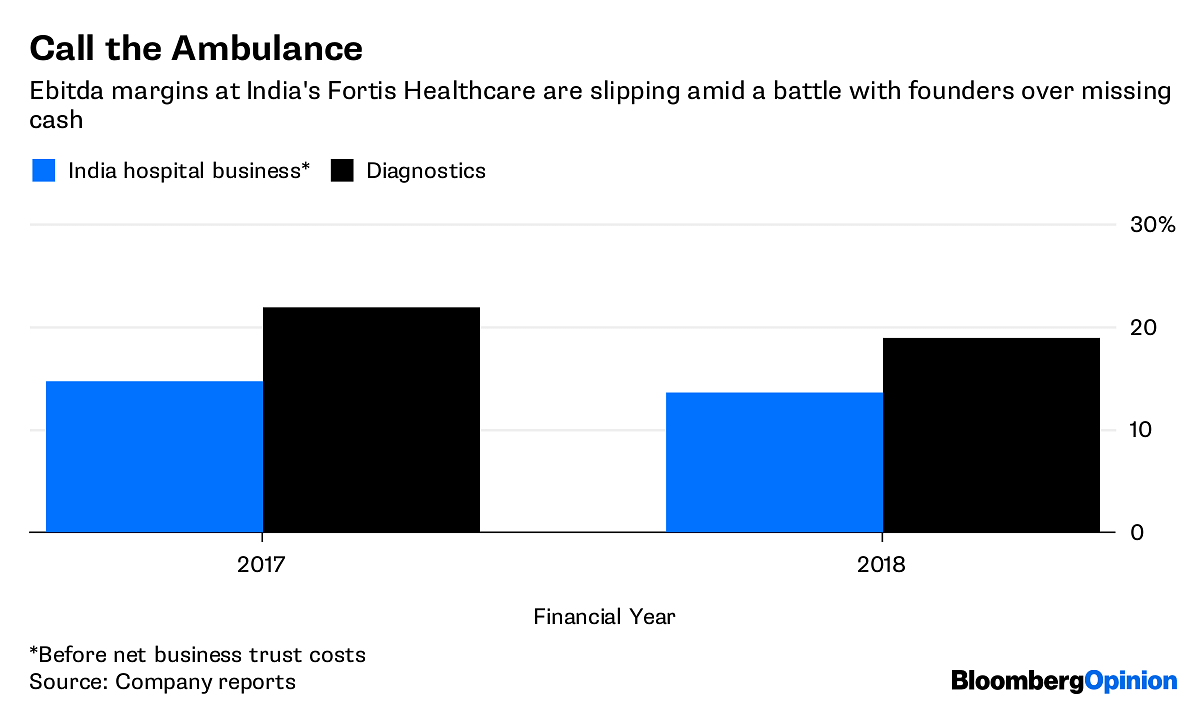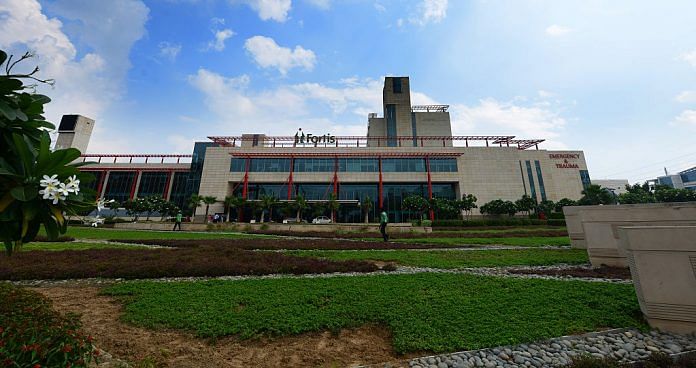Amidst an unprecedented fall in the EBITDA margins of Fortis, whether its two bidders can revive the company’s operations is a million dollar question.
Fortis Healthcare Ltd.’s auditors have cleared the decks for its sale. Never mind that Deloitte Haskins & Sells LLP’s heavily qualified audit report reads like a discharge slip for a patient running low on both time and luck.
Working out whether India’s second-biggest hospital chain is too deeply damaged to survive has been left to the imagination of the two bidders jostling for the opportunity to nurse it back to health. Malaysia’s IHH Healthcare Bhd. and TPG-backed Manipal Health Enterprises Pvt. have already submitted firm bids. IHH is more likely to emerge victorious because it’s planning to make an open offer to shareholders at a 10 per cent to 15 per cent premium, Livemint reported on Monday.
The 6,500-bed company has good standing with doctors and patients, but its war with its founders is worrisome baggage. Fortis claims brothers Malvinder and Shivinder Singh diverted 5 billion rupees ($73 million) of the publicly traded company’s cash to other entities without board approval.
A probe by an independent law firm has even raised the possibility that the founders may have used fresh funds to repay a part of previous advances. The board says it will leave it to regulatory inquiries to determine whether a fraud has occurred. India’s Serious Fraud Investigation Office is already on the job.
The Singhs, who are no longer with the company, deny any wrongdoing. But having lost their shareholding to creditors, they’re also queering the pitch for the eventual new owner by asserting their family’s rights over the Fortis brand. The company, meanwhile, is trying to recover funds from the Singh brothers. But IHH and TPG-Manipal can’t be hoping to see any of that money soon. Whether existing loss provisions will be sufficient is a bigger question.
Other bidders, including KKR & Co., as well as two prominent New Delhi-based business families acting together, have dropped out. Being hospital operators themselves, IHH and Manipal see enough value in the acquisition to stay in the race despite not knowing the true financial position of the target. Luckily for them, Deloitte didn’t unearth any further material losses to add to the 9.3 billion rupee deficit for the March quarter reported by the new board, which has no ties to the Singhs.
However, even the auditor can’t say for sure if the results will stand, or will have to be recast. More worryingly, the drama with the founders is beginning to bite into operational performance. Operating margins at the local hospital business slipped to 13.6 per cent last year, from 14.7 per cent. Occupancy dropped to 65 per cent in the March quarter, a 5 percentage point fall from the previous three months. Profitability sagged even more at the company’s diagnostics business. Fortis desperately needs fresh equity and a shareholder who can assure doctors they won’t be left stranded on a sinking ship.

While shareholders will no doubt want the board to take the offer that gives them the juiciest exit, the directors have to take a broader view. Had Fortis been a bank, it would have been judged too big to fail. Demand for healthcare services in India, a country with one of the world’s lowest penetration rates for medical insurance, is set to explode. Prime Minister Narendra Modi has announced a health protection plan to cover 100 million poor families. For now, even healthcare companies don’t know how exactly “Modicare” will be funded, or whether the pricing mandated by the government will even be profitable.
One thing is clear, though: Future governments will have no option except to expand state-subsidized insurance to middle-class patients as well. As India’s second-biggest hospital network, Fortis’s long-term survival – and its ability and willingness to work with the government – will be important, as will be the dexterity with which the new owner can navigate messy land leases, and a popular impression that private hospitals are profiteering.
The board believes that Fortis is a going concern, and for now Deloitte is sticking with that assessment. Before any new ailments are diagnosed for the auditor to have to change that opinion, the patient needs to find new caregivers”. – Bloomberg




I fail to understand why an insurance is necessary at all. If I am sick I go to a doctor and pay his charges. Cut the Insurance Co to its size.
Ranbaxy, once one of India’s most trusted brands in pharmaceuticals, proved a lemon for its Japanese buyers, Dai ichi, who sold it later to Sun Pharmaceuticals. There was a lot of fudging in that transaction, for which the Brothers Singh are still trying to wriggle out of responsibility. They would have prospered more if they had practised a higher standard of corporate governance.